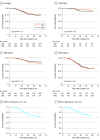Laparoscopic vs Open Distal Gastrectomy for Locally Advanced Gastric Cancer: Five-Year Outcomes From the CLASS-01 Randomized Clinical Trial
- PMID: 34668963
- PMCID: PMC8529527
- DOI: 10.1001/jamasurg.2021.5104
Laparoscopic vs Open Distal Gastrectomy for Locally Advanced Gastric Cancer: Five-Year Outcomes From the CLASS-01 Randomized Clinical Trial
Abstract
Importance: It is not clear whether laparoscopic and open distal gastrectomy produce similar outcomes among patients with locally advanced gastric cancer. Data from a multicenter, randomized clinical trial (Chinese Laparoscopic Gastrointestinal Surgical Study [CLASS]-01) showed that laparoscopic distal gastrectomy did not result in inferior disease-free survival at 3 years compared with open distal gastrectomy.
Objective: To report 5-year overall survival data from the CLASS-01 trial of laparoscopic vs open distal gastrectomy among patients with locally advanced gastric cancer.
Design, setting, and patients: This was a noninferiority, open-label, randomized clinical trial conducted at 14 centers in China. A total of 1056 eligible patients with clinical stage T2, T3, or T4a gastric cancer without bulky nodes or distant metastases were enrolled from September 12, 2012, to December 3, 2014. Final follow-up was on December 31, 2019.
Interventions: Participants were randomized in a 1:1 ratio after stratification by site, age, cancer stage, and histologic features to undergo either laparoscopic distal gastrectomy (n = 528) or open distal gastrectomy (n = 528) with D2 lymphadenectomy.
Main outcomes and measures: The 5-year overall survival rates were updated to compare laparoscopic distal gastrectomy with open distal gastrectomy. All analyses were performed on an intention-to-treat basis. In addition, per-protocol and as-treated analyses were performed for overall survival.
Results: Data from 1039 patients (726 men [69.9%]; mean [SD] age, 56.2 [10.7] years) who received curative therapy were analyzed. At 5 years, the overall survival rates were 72.6% in the laparoscopic distal gastrectomy group and 76.3% in the open distal gastrectomy group (log-rank P = .19; hazard ratio, 1.17; 95% CI, 0.93-1.48; P = .19). After comparison for competing risk events, gastric cancer-related deaths (hazard ratio, 1.14; 95% CI, 0.87-1.49; P = .34) and deaths from other causes (hazard ratio, 1.23; 95% CI, 0.74-2.05; P = .42) did not differ significantly between groups. Overall rates of survival did not differ significantly between groups with each tumor stage.
Conclusions and relevance: This study found that laparoscopic distal gastrectomy with D2 lymphadenectomy performed by experienced surgeons in high-volume specialized institutions resulted in similar 5-year overall survival compared with open distal gastrectomy among patients with locally advanced gastric cancer.
Trial registration: ClinicalTrials.gov Identifier: NCT01609309.
Conflict of interest statement
Figures



Comment in
-
Laparoscopic Gastrectomy for Locally Advanced Gastric Cancer-Reply.JAMA Surg. 2022 Jun 1;157(6):546. doi: 10.1001/jamasurg.2021.7583. JAMA Surg. 2022. PMID: 35171206 No abstract available.
-
Laparoscopic Gastrectomy for Locally Advanced Gastric Cancer.JAMA Surg. 2022 Jun 1;157(6):545-546. doi: 10.1001/jamasurg.2021.7582. JAMA Surg. 2022. PMID: 35171219 No abstract available.
References
-
- Kitano S, Iso Y, Moriyama M, Sugimachi K. Laparoscopy-assisted Billroth I gastrectomy. Surg Laparosc Endosc. 1994;4(2):146-148. - PubMed
-
- Kim W, Kim HH, Han SU, et al. ; Korean Laparo-endoscopic Gastrointestinal Surgery Study (KLASS) Group . Decreased morbidity of laparoscopic distal gastrectomy compared with open distal gastrectomy for stage I gastric cancer: short-term outcomes from a multicenter randomized controlled trial (KLASS-01). Ann Surg. 2016;263(1):28-35. doi: 10.1097/SLA.0000000000001346 - DOI - PubMed

